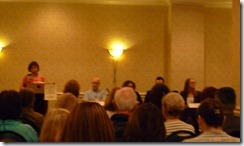In Getting an Agent – Part 1, we discussed how to find a literary agent. Let’s say you’ve made the connection. Here’s what to do next.
Questions to ask a potential agent
How many agents and staff work in your agency?
How many clients does the agency represent? How many clients do you handle personally?
How long have you been an agent? Are you a member of AAR?
What is your particular area of interest?
How many new authors have you sold in the past year?
What is your average response time for a completed manuscript?
Do you prefer emails or phone calls?
How long does it take for you to return a phone call or email inquiry?
How do you feel about multiple submissions?
How long do you wait after sending an editor a manuscript before following up?
Do you give your client an update on the status of their projects, or do they have to contact you?
How many rejections would it take on a manuscript before you stop marketing it?
Do you handle subsidiary rights, such as translation, foreign sales, film/TV, audio?
Do you offer a written or verbal contract?
What percentage do you charge? (15% is standard for domestic sales)
What happens if you die or are disabled?
Do you deposit money received into an escrow account for clients?
How soon do you pay clients after receiving a royalty check?
How do you keep track of submissions?
Do you submit to digital first publishers?
Do you allow an author to do indie projects separate from the work you represent?
What do you expect from your clients?
Contracts

Not all agents offer written contracts. If you do get one, be careful to read the terms before you sign. See if the agreement covers only this project or everything you write. You may request changes, such as to specify novel-length works of fiction only. If you want to do indie projects on the side, make sure the agent is agreeable and that you’re not obligated to pay him any part of this income. The agent should get paid only for rights he sells on your behalf.
Be careful of committing yourself for more than a year, and make sure you can disengage with a written notice. If you terminate, you should have no further obligation to the agent except for works which the agent has submitted or sold.
Beware of “interminable agency” or “perpetual agency” clauses in your publishing contracts. This clause grants the agent the exclusive right to represent your work for the length of the copyright. Terminology like “agency coupled with an interest” is also to be avoided. Do not commit for sequels or subsequent works or the length of your copyright. Also examine the clause an agent puts into a publishing contract when the time comes. Some of the professional writing organizations have sample contracts online, so get involved in the writing community and ask experienced authors your questions after you’ve done your own research.
How to tell if your agent isn’t working out

A. You never hear from him.
B. He doesn’t answer your calls or emails.
C. You don’t receive copies of rejection letters if you’ve requested them.
D. The agent turns down your new ideas.
E. He claims to be busy with more important clients.
F. You find out he never submitted your manuscript to an editor as promised.
How to switch agents
Send your current agent a letter or email and say your relationship isn’t working out as desired, and you wish to move in a new direction. Thus you are terminating your agreement. Keep a printed copy of his acknowledgment. Keep in mind that you remain under obligation to this agent for any work he has submitted or sold for you. To be clear on the termination terms, check your agency agreement. Once you are free from your previous relationship, you can seek a new agent.
Author/Agent Etiquette

- Be prepared to suggest markets to an agent to show you are savvy about the business and have done your research. It’s hard to keep up with all the changes in the publishing industry. Consider your relationship as a business partnership where you each contribute.
- Don’t accost an agent in the restroom at a conference or if they are in a deep discussion with another author.
- Leave your manuscript at home. If an agent agrees to see your work, follow up with an email and ask for his submission requirements. Remind him where you met.
- Don’t hound your agent. Responses from editors can take months. If you need someone to hold your hand, join a critique group. Remember that you are not the agent’s only client.
- Always be courteous and professional. Keep producing new work at a steady pace. Listen to your agent’s suggestions even if you agree to disagree. Maintain a social media presence and keep up to date on industry news.
CLICK TO TWEET
Coming Next: Tips for the Hot Pitch
<><><>
Sign up for my Newsletter for my latest book news, giveaways, sales, and events. Free book sampler for new subscribers.








